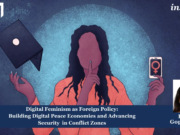Policy Update
Saniya Verma
Introduction
As someone passionate about how power shapes society, I’ve been reflecting on the Ministry of Information and Broadcasting (MIB) in India, a body that’s been around since Sardar Vallabhbhai Patel’s time and claims to bridge the government with the public. Lately, though, its actions like the 2023 BBC raids and advisories on live coverage have sparked debates about whether it’s safeguarding democracy or stifling it. With India dropping to 150 in the World Press Freedom Index 2022, an all-time low, I decided to explore fresh cases to find out whether the MIB’s actions are protecting national interest or stifling free expression. This article investigates that dilemma, questioning the balance between security and democratic rights.
Background
The MIB, established post-independence, runs media platforms like Doordarshan and All India Radio, with the aim of reaching government policies to people. Its remit grew with digital media, introducing devices like the Press Sewa Portal and working on the Broadcasting Services (Regulation) Bill since 2023 to control content. Historically, it’s been a tool to unify a diverse nation, but critics argue it’s increasingly a mouthpiece for the ruling party, especially since Narendra Modi’s 2014 tenure.
The 2022 Reporters Without Borders Report points to reduced press freedom, and it’s possible that government coercion via tax raids and ad subsidisation (₹64.9 billion expended from 2014 to 2022) is stifling dissent. This is in turn to prepare the ground for my analysis of whether new initiatives are intruding into nondemocratic space.
Functioning
The Ministry of Information and Broadcasting (MIB) is tasked with regulating the information ecosystem in India, primarily through agencies like the Press Information Bureau and the Central Board of Film Certification. While its stated role includes information dissemination, public awareness campaigns, and oversight of media standards, in practice, it often wields significant influence over media narratives. This is done via advisories and legal provisions. For instance, in April 2025, it issued an advisory following the Pahalgam terror attack (which killed 26 tourists), asking channels to avoid live coverage of defense operations on grounds of national security.
Controversies have also arisen—for example, the 2023 BBC office raids, which followed a documentary on Prime Minister Modi’s role in the 2002 Gujarat riots, and the 2022 Media One case, where a channel’s security clearance was withheld over its alleged “anti-establishment” stance. These actions often involve coordination with bodies like the Intelligence Bureau and rely on sealed cover evidence, raising questions about transparency and accountability.
Performance
The MIB’s actions in recent years reflect an emerging trend of swift, reactive measures. For example, the advisory issued after the Pahalgam terror attack was aimed at preventing public panic, aligning with security concerns due to the discovery of foreign terrorist links. Similarly, the BBC faced three-day tax raids following its documentary on the Prime Minister, which led to tax notices—though the broadcaster maintained it had acted within its rights. In another case, the Supreme Court’s 2023 ruling in favour of Media One overturned the government’s denial of security clearance, deeming it a violation of the right to a fair hearing under Article 21.
Despite these assertive interventions, the effectiveness of MIB’s approach remains contested. During the 2025 India-Pakistan war, disinformation still spread widely, with news channels airing fake images—suggesting that advisories issued by the ministry lack real enforcement power. As a result, critics argue that the ministry’s actions seem more focused on controlling the narrative than genuinely protecting public interest.
Effect
These actions have a chilling effect on the media. The BBC raids, termed as “vendetta” by the Press Club of India, intimidated critical journalism, with journalists like Ravish Kumar resigning from NDTV in the face of Adani takeover fear. The Media One case showed how “anti-establishment” labels—tied to UAPA criticism can be manipulated to justify censorship, and the Pahalgam advisory limited live public viewing of defense updates, fueling distrust. Sociologically, this is akin to James Scott’s “weapons of the weak”—media institutions revolt in low-key ways, but public trust in news dropped to 41% in 2024 (Reuters Institute), which implies a democracy where information flow becomes increasingly curated.
Emerging Issues
Certain problems specifically come into view. Sealed covers usage, like in Media One, avoids public scrutiny, and was criticized as unfair by the Supreme Court. The Parliament breach of security in 2023 (yellow gas episode) saw 141 MPs suspended for demanding explanations, while the silence of the MIB on media functions raised doubts on united narratives. Security breaches such as the 2018 Aadhaar leak via government websites are highlighted by data breaches, which are not tackled by the MIB but penalized in the media for gaffes. The vague “harmful content” provision in the Draft Broadcasting Bill promises overreach, recalling the 2023 fact-check unit controversy, where the Supreme Court brought government control of truth to an end.
Way Forward
There must be a balanced reaction. The MIB can conduct open hearings, instead of covered covers, with public interest immunity proceedings, as the Supreme Court has suggested. A ₹200 crore corpus would be able to train 10,000 journalists in ethical journalism till 2027, reducing misinformation risk. Revision of the Broadcasting Bill, incorporating the involvement of stakeholders, media organizations, and civil society, can demystify regulation, such that security does not have to come at the expense of free speech. Enhancing data security, after Aadhaar has helped in this regard, would increase credibility, closer to democratic rather than authoritarian leanings.
Conclusion
The MIB’s recent moves, the BBC raids, Media One denial, and Pahalgam advisory betray a ministry torn between security and democracy. National interest must be safeguarded, but a lack of transparency and autocratic methods reveal a breakdown, eroding press freedom and the people’s trust. India’s rich media tradition must be nurtured to be killed. When I see this, I see a call to reform that enables but does not dominate so that the MIB is a democratic partner, and not a regulator.
References
Agarwal, B. (2010). Gender and green governance: The political economy of women’s presence within and beyond community forestry. Oxford University Press.
Reporters Without Borders. (2022). 2022 World Press Freedom Index. https://rsf.org/en/index
Reuters Institute for the Study of Journalism. (2024). Digital news report 2024. University of Oxford. https://reutersinstitute.politics.ox.ac.uk/digital-news-report/2024
Scott, J. C. (1985). Weapons of the weak: Everyday forms of peasant resistance. Yale University Press.
The Hindu. (2023, February 9). Supreme Court quashes Centre’s ban on Media One news channel. https://www.thehindu.com/news/national/supreme-court-quashes-centres-ban-on-media-one-news-channel/article66494405.ece
BBC News. (2023, February 14). India tax raids: BBC offices searched in New Delhi and Mumbai. https://www.bbc.com/news/world-asia-india-64639532
Press Information Bureau. (2025, April 10). MIB issues advisory on live coverage post-Pahalgam attack. https://pib.gov.in/PressReleasePage.aspx?PRID=20250410
Ministry of Information and Broadcasting. (2023). Draft Broadcasting Services (Regulation) Bill, 2023. https://mib.gov.in/broadcasting-regulation-bill
Parliament of India. (2023, December 18). Suspension of 141 MPs over security breach. https://loksabha.nic.in/News/ParliamentaryBulletin.aspx
Acknowledgement: I am thankful for the continuous guidance, intellectual support, and the collaborative spirit that IMPRI fosters in all its initiatives.
About the Author: Saniya Verma has an honours in Sociology from the University Of Delhi and is a researcher at IMPRI.
Disclaimer: All views expressed in the article belong solely to the author and not necessarily to the organisation.
Read more at IMPRI:
Depths of Concern: An Inquiry on Deep Sea Mining and Ocean Governance
Small Towns, Big Emissions: Why South Asia’s Unsung Urban Areas Deserve Climate Attention



















